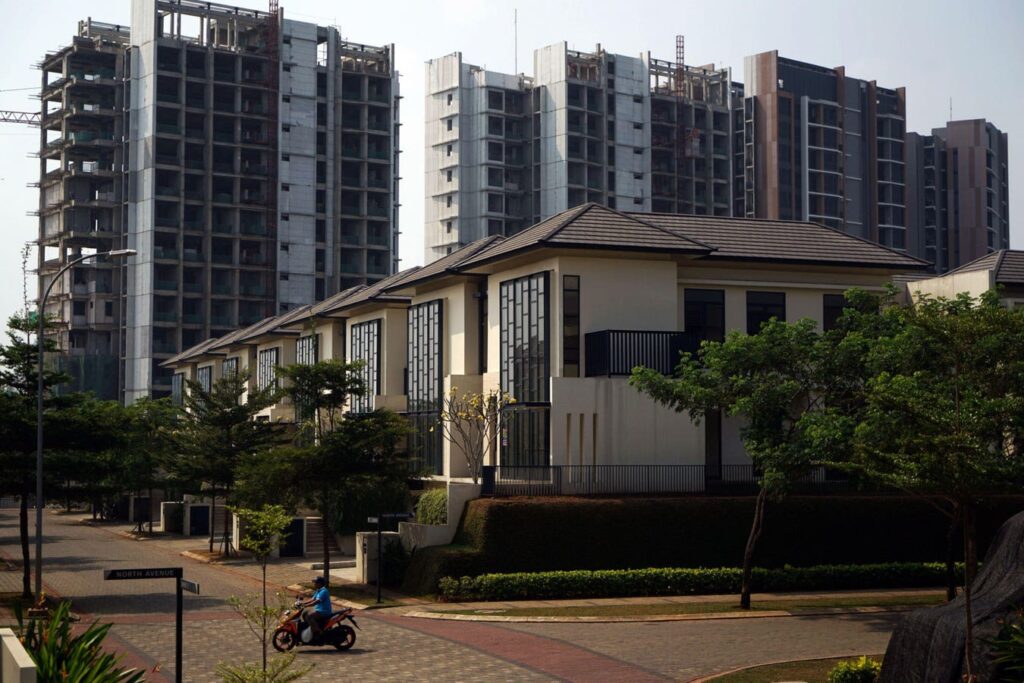Residential buildings stand under construction in the Bumi Serpong Damai (BSD) City area of … [+]
Indonesia’s tycoons will continue pouring money into real estate next year despite high interest rates and a tight presidential election, partly thanks to government incentives.
At least two listed companies owned by tycoons, the Widjaja family’s Bumi Serpong Damai (BSDE) and Alexander Tedja’s Pakuwon Jati (PWON), will invest 4.5 trillion rupiah ($290 million) in real estate projects next year.
BSDE is investing up to 3 trillion rupiah ($195 million) next year, while PWON will invest 1.5 trillion rupiah.
The Ciputra family’s Ciputra Development (CTRA) has also committed to building a 300-hectare housing project in the new capital, Nusantara.
PWON broke ground on a hotel project in the new capital in November. The Pakuwon Nusantara Superblock will be built on 7.2 hectares of land and will feature three hotels, shopping mall and condominiums. Total investment in the project is expected to reach 5 trillion rupiah.
“This Groundbreaking of Pakuwon Nusantara is a sign of our full support to Nusantara Capital City (IKN),” Eiffel Tedja, president director of PWON, said in a statement. “Other than Pakuwon Nusantara, we currently have in our pipeline new superblock projects in Bekasi, Batam and Semarang — which in the future when they are in operation, will expand our existing four superblocks in Jakarta and Surabaya.”
Indonesia’s economy grew 4.94% in the third quarter of this year thanks to resilient household consumption and increasing investments. The latest Residential Property Price Survey by the central bank rose by 1.96% year on year in the third quarter, showing strength in the new housing market.
BSDE is building its flagship project, BSD City, on the western outskirts of Jakarta. The company started the project in the early 1980s and the finished development will span 6,000 hectares. Some 2,450 hectares still need to be developed.
“We are optimistic about the business potential in 2024, especially with the government giving VAT incentives until next year,” Hermawan Wijaya, director of BSDE, said in an email.
According to Wijaya, the previous year’s value-added tax (VAT) incentives gave a boost to demand for the company’s housing projects. President Joko Widodo reapplied the incentive when he launched several measures to spur growth in Southeast Asia’s largest economy in October. The government will scrap an 11% VAT on the purchase of homes below 2 billion rupiah ($129,000) from last month to next June. After that, the government will give a 50% VAT discount until the end of 2024.
Maynard Priajaya Arif, head of Indonesia research at DBS, expect the presidential election next year to lead to slower property sales as both developers and buyers take a wait-and-see stance.
“For BSDE we see that there will be a slowdown next year,” Arif said in an email, “but it is not drastic as there is still some land sales and positive impact from the tax incentive.”
High interest rates will also discourage purchases. Indonesia’s central bank raised its base rate to 6% in October from 5.75% and maintained that level in November.
“The impact from interest rates will depend on the banks,” Arif said, “and whether they will quickly raise the rate or not as currently the banks still offer competitive rates for home loans.”
